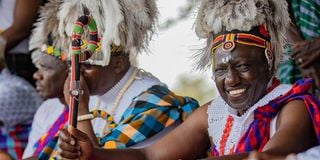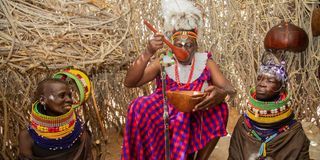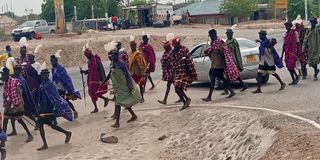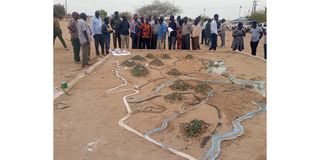Premium
Ruto savours annual ‘Tobong'u Lore’ Cultural Festival in Lodwar

President William Rutot donned in traditional regalia at the Lodwar town at the Turkana Cultural and Tourism Festival on 12 October 2023.
What you need to know:
- President William Ruto arrived in Lodwar town on Wednesday evening ahead of the festival that kicked off Thursday morning to celebrate Turkana's cultural heritage and diversity
- Tobong'u Lore is a Turkana phrase that means 'welcome home' and refers to the archaeological and palaeontological heritage of the Turkana Basin
- The overall goal of the festival is to position Turkana County as the origin of humanity, a destination of choice for cultural tourism, and to promote indigenous learning on climate change adaptation
Lodwar Town has come alive ahead of the Turkana Tourism and Cultural Festival popularly known as Tobong'u Lore Cultural Festival.
President William Ruto arrived in Lodwar town on Wednesday evening ahead of the festival that kicked off Thursday morning to celebrate Turkana's cultural heritage and diversity.
Hundreds of locals and visitors, dressed in their traditional ornaments and attires, had by Wednesday arrived in the town showcasing their diverse cultures for the seventh edition of the festival.
The news that President Ruto will grace this year's festival after arriving on Wednesday evening has electrified the event and attracted many visitors.

President William Ruto donned in traditional regalia takes part in the seventh edition of Turkana Cultural and Tourism Festival held at Lodwar on 12 October 2012.
Tobong'u Lore is a Turkana phrase that means 'welcome home' and refers to the archaeological and palaeontological heritage of the Turkana Basin.
Following the discovery of the world's most complete human fossil, known as the Turkana Boy, in the village of Nariokotome by world-renowned paleoanthropologists, it is believed that every human being traces their roots to Turkana.
The annual cultural festival, which starts just a day after Kenyans celebrated Utamaduni (Culture) Day, brings pastoralist communities from Kenya, Ethiopia, South Sudan and Uganda to Lodwar to showcase their rich cross-border cultural heritage.

Turkana residents donned in traditional regalia arrive in Lodwar town on October 11, 2023 ahead of the seventh edition of Turkana Cultural and Tourism Festival.
The indigenous communities, who still cling to their traditional ways of life, use the festival to promote peaceful coexistence through song and dance.
Launched in August 2014 at St Patrick's Primary School in Kanamkemer, Lodwar town, the festival has lived up to its promise of promoting unity among warring pastoralist communities by giving them an opportunity to showcase and celebrate their shared culture.
The overall goal of the festival is to position Turkana County as the origin of humanity, a destination of choice for cultural tourism, and to promote indigenous learning on climate change adaptation.
Delegations from neighbouring countries are led by senior government officials who believe that bringing pastoralist communities together to showcase their cultures promotes cohesion in a region that has been riven by conflict over cattle raiding and competition for scarce resources in the arid and semi-arid lands.
Uganda's First Lady Janet Museveni led a delegation from her country to the second festival in 2015, which was also attended by Kenya's former First Lady Margaret Kenyatta.
Elders and special guests wear headdresses adorned with ostrich feathers to show their highly respected role in society.
According to the Turkana County Department of Tourism, Culture and Heritage, the best cultural groups at the county level will perform songs and dances locally known as 'edong'a', 'lodapal', 'naleyo', 'ekaro' and 'ekimomwor' at the three-day festival.
The groups were selected through county-wide auditions prior to the festival and are expected to showcase their unique cultural artefacts as an expression of their diverse and distinctive lifestyles.
The County Executive for Tourism, Culture, Natural Resources and Climate Change, Dr Iris Mariao, said unlike in the past, the festival has expanded from showcasing folk dances – Ekimwomwor and Naleyo – throughout the festival to displaying various cultural and creative artefacts such as traditional regalia and food.
Apart from advocacy for peace, most of the performances will highlight occasions such as bumper harvests, spirituality, praise to deities for rains, and songs asking God to alleviate droughts.
"This year’s festival will showcase an array of the rich cultural heritage of the Turkana people, including traditional food, the colourful Turkana ushanga beadwork, traditional regalia, crafts and artefacts, folk songs and dances, [and] oral narrations of the rich history and lifestyle of the Turkana community," he said.

Turkana Governor Jeremiah Lomorukai and security team assess some of the structures at Ekalees Center, venue for the seventh edition of Turkana Cultural and Tourism Festival, on October 11, 2023.
Opportunities for exhibitions and sampling of the hospitality industry, including excursions to Lake Turkana, the world’s largest permanent desert lake, will be on display for our visiting guests, he noted.
The Turkana community is one of the largest ethnic groups in the country, not only practising traditional pastoralism in an arid environment, but one with immense opportunities for growth through cultural tourism.
The community has unique traditions, customs and way of life, with different clans maintaining a rich cultural heritage through traditional dress, song, dance, rituals and oral history.
Mr James Ekitela, a community elder, said cultural groups from the 30 wards always get an opportunity to perform for guests at the Ekalees Centre in Lodwar town, wearing traditional regalia.
Neighbouring communities from Kenya, Ethiopia, South Sudan and Uganda, who also hold on to their traditional ways of life, send delegations that also participate in singing and dancing to promote peaceful coexistence.
Mr Ekitela said the event would kick-start the process of reviving the dwindling fortunes of the tourism sector and also promote unity and national cohesion among the Kenyan communities represented.
"As locals, we do not only clinch our hopes on showcasing our local tradition to attract visitors but we believe it is one way of improving our nationhood by having young people who are already exposed to modern way of life to learn, experience and appreciate the rich diverse cultural values of various ethnic groups in the country and neighbouring countries," he said.
Rural women in the Aberu Kori Ushanga Cooperative Society are trying to capitalise on the event to sell beaded products. A founding member, Mercy Ekaran, said they realised that as much as beads are an essential part of everyday dress in the community, worn to indicate age, marital status and influence in society, they also have a monetary value.
She said a teenage girl in Turkana walks around with Sh100,000 worth of beads around her neck to attract potential suitors, while an elder has a Sh20,000 ostrich feather hat to wear on special occasions, yet such families rely primarily on relief food and their children do not go to school due to poverty.
"As women talented in beading, we are making beaded products for societal benefits and business. We will sell products such as bracelets, necklaces, rungus, belts, and earrings," Ms Ekaran said.
Turkana Governor Jeremiah Lomorukai says his administration will use the event to market its rich culture and attract tourists who associate the county with hardship, insecurity and hunger.
"Besides the rich culture, Turkana is the origin of mankind where the remnants of the world-famous Turkana Boy were found," said Mr Lomorukai.
He said the event aims at celebrating the rich culture of pastoralists to promote peaceful coexistence among communities that have been fighting over resources and borders.
"After the event, we expect to realise relative peace along the borders to promote cross-border trade. Turkana is one of the communities with a rich culture that is not imitated, but little has been done to package and market it. We want to rectify that so that even the international community can know our regalia, tools, and food," the governor said.
In 2016, former Governor Josphat Nanok declared the festival an annual event to welcome the world to the 'Cradle of Mankind' after a huge turnout of local and international guests.
Governor Nanok had said that everyone would trace their roots to Turkana after world-renowned paleoanthropologists discovered the world's most complete human fossil – Turkana Boy – in Nariokotome village.




